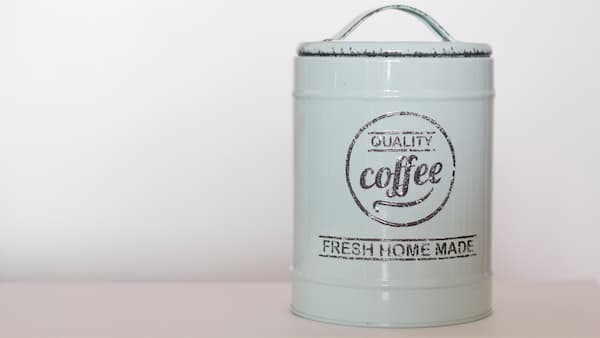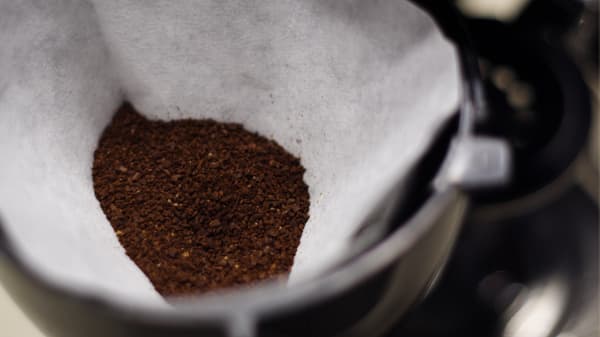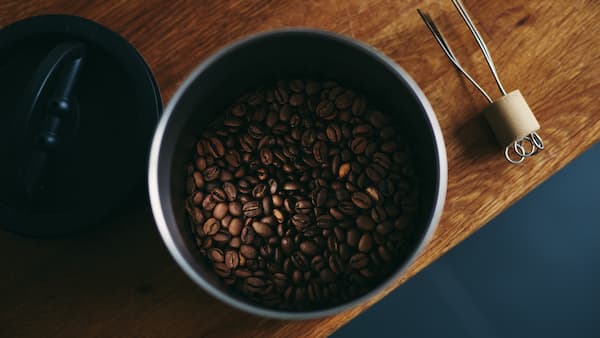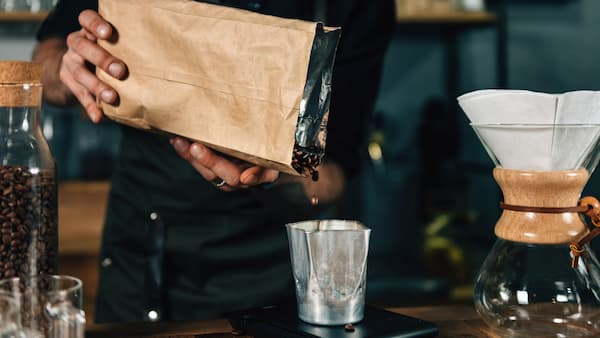How To Store Coffee Beans Properly
The perfect cup of coffee comes down to a few key factors: quality beans, the right grind, and water being the three most important. However, there’s one more essential factor to keep in mind, the freshness of the beans.
How you store your coffee beans will make a massive difference in the quality of your coffee. But not only that, knowing how to store coffee beans will also help you maintain and extend the shelf life of your favorite beans.
If you need tips on coffee storage, this article is for you!

Coffee Exposure Loses Flavor
Coffee beans are a food product and their perishable. Just like spices or nuts, that means that over time they can lose flavor. In fact, thinking of coffee like you do your favorite herbs will help you track down the best coffee containers for your beans and help you figure out the best way to store coffee.
Exposure to four main things cause coffee to lose flavor:
- Light
- Heat
- Moisture
- Air (oxidation)
All four of these elements break down the chemicals that make coffee taste great – the oils and aromatic compounds found in the beans. These oils are locked into the coffee beans when they’re green, and the process of drying and roasting them helps to bring them out and intensify them.
Without getting too technical, the substances in coffee that make it taste so great are volatile. This means that the bonds holding the compounds together aren’t all that stable, and as a result those compounds break down and dissipate quickly.
This in turn means that changes in temperature can cause them to break down because they aren’t stable. The wrong temperature, over time, makes these chemical bonds break apart. Just under room temperature is an ideal range to store coffee.

Light affects everything on the planet, and coffee beans are no different. Just like heat, light can affect the structure of the compounds in your coffee beans. Much like heat, it can break down chemical bonds, causing the beans to lose flavor quicker.
As you can probably guess, most of the flavorful compounds in coffee are water-soluble, which means they dissolve easily in water. This means that exposure to water pulls some of these compounds out of the beans, whether it’s while you’re brewing or not. Humidity in the air is the monster you can’t see sucking flavor from your beans.
Finally, air. As mentioned before, the chemical compounds that make coffee taste good are very fragile. When exposed to air, they break down quickly.
This is part of why the smell of brewing coffee dissipates over time: the chemicals that bring flavors and aroma fall apart in the air, and pretty quickly too. Oxygen itself also helps to break down these compounds.
In short: the biggest enemies of the coffee bean are air, light, heat, and moisture. To keep your freshly roasted coffee beans fresh and in the best condition for as long as possible, store your coffee beans in canisters that keep exposure to those elements to a minimum.
What’s The Best Way To Store Coffee?
The best way to store your coffee is very similar to the best way to store spices, or tea, or anything else with volatile chemicals. You want it to be away from all of the things that can make it break down faster and lose flavor.
What you’re really looking for is an opaque, airtight canister. You want it to be opaque even if you’re going to be storing it in a cabinet or pantry because opening and closing the door will expose it to light.
Metal and ceramic are favorites, but even opaque plastic is a solid option. You can easily store these kind of canisters within your pre-existing coffee table setup, there’s no need to lock the jar away.
An airtight seal on your chosen coffee storage container is one way to ensure that it isn’t exposed to air.
There are a few different methods for getting a good airtight seal on a top, but the important thing is to make sure that that seal is there–and, of course, that you can still open and close the container fairly easily. As an added bonus, it will keep moisture out as well as most of the oxygen.

But what about the bag it comes in?
Many coffee companies sell their beans in resealable, airtight bags. The original packaging from the coffee shop tends to also be opaque, with some of them even having a reflective coating on the inside to go a step further to keeping light out.
Usually this packaging has a locking mechanism that lets the necessary gases out while not letting air in.
These bags are fine for holding coffee for resale, and the resealable versions are an okay option if you go through your coffee relatively quickly.
But keep in mind that the seals on these bags aren’t as strong as some other container types. Over longer periods of time, you are more likely to lose freshness, flavor and aroma in your beans.
But for short-term purposes, this kind of coffee bags will suffice. Just make sure that you’re going through your coffee quickly enough, and buying frequently, to get the best results from your beans.
Should I Freeze Coffee?
The big question that coffee lovers often ask: is it okay to freeze coffee for long-term storage? There’s no clear consensus on the topic, and coffee experts have different opinions on putting coffee in the freezer, for a good reason.
Freezing coffee beans does ensure that they aren’t exposed to light or heat, and if you freeze in an airtight container, you’re also limiting exposure to air.
But depending on the container you use in your freezer, it can still be exposed to air, and worse: the inside of any freezer tends to be a very wet place, so moisture is a risk, just like with food you put in the freezer.
If you’ve ever seen a freezer full of frost, you can appreciate just how much water is actually in there, and that water can end up condensing on your beans if they aren’t stored and handled correctly.
The big risk here is that instead of helping keep your beans fresh longer, putting your beans in the freezer might actually make the beans go stale more quickly.
Some experts suggest that you can get the best of all outcomes by freezing your coffee beans in an opaque, airtight container. For example, tin foil, wrapped in plastic, with an airtight seal.
This would avoid the majority of the possible problems, but not all coffee experts are convinced that it works perfectly for the risks that come with the freezer environment.
We think that it’s not really worth it to freeze your coffee. The risks that come with it tend to outweigh the possible benefits, and unless you have a treasure trove of ten or more pounds of coffee, it makes more sense to make sure you consume your beans relatively quickly.
Freezer burn is not a flavor anyone enjoys. Espresso can especially take on a more bitter taste, since it tends to be oilier.
If you buy your coffee regularly and store it at home properly in canisters in a cool, dark environment and avoid exposing it to air or moisture, you’ll reap the rewards in the form of a great cup every time.
How Long Does Coffee Stay Fresh?
So what kind of shelf life does fresh roasted coffee really have? It depends a lot on the storage you use for your beans, but even under the best circumstances, the flavors and aroma of coffee begin to degrade almost immediately.
A good coffee container or bag aims to minimize the loss of potency as much as possible. You might not be able to stop it altogether, but with the right storage setup, you can keep your coffee fresh for a more extended period.
Freshly roasted coffee needs to degas or lose carbon dioxide for up to 72 hours. This is why most of the packing you see companies using has a vent. The bag vent allows the carbon dioxide to escape without letting air in. So if you’ve got a super fresh bag (check the roasting date), give it some time to degas first.
Ideally, you should aim to consume your coffee within two weeks of bringing it home and opening the bag.
That way, you get the best flavors from any brewing method, whether you use an espresso machine or any other kind of coffee maker. The longest you should keep your beans is about a month.
Overall, you should try to stick with buying what you need for about two weeks at a time and stock up often.
If you’re forgetful, consider purchasing a coffee subscription so that you have fresh roasted coffee anytime you need it and your coffee supply doesn’t run out unexpectedly. Many coffee subscription services offer ground coffee as well as whole coffee beans.

Ground Coffee Degrades Quicker
Another factor to consider is whether you’re storing whole beans or ground coffee. Ground beans lose their flavor faster than whole bean coffee because there’s a larger and exposed surface area for heat, light, oxygen, and moisture to eat away at.
If you prefer ground coffee or don’t have a coffee grinder, try to get through it in a week. Whole beans may be worth the trouble if you don’t go through coffee quickly.
Roast Yourself For The Best Results
Other coffee lovers who are fanatical about freshness prefer to roast their coffee at home, but while this is the freshest you’ll get, it isn’t a necessity.
Cold Brewing Revitilaizes Old Beans
What should you do if, despite your best efforts, you end up with stale coffee beans? Put them into cold brew! While fresh coffee is better for every application, the long brewing time for cold brew helps to extract more flavor from the coffee beans, which means you’ll still get a great result in your cup.

